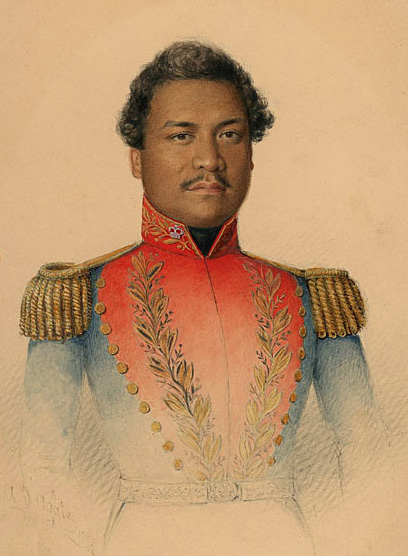The Hawaiian Islands had increasing connections with the outside world following its discovery by the Englishman Captain James Cook in 1778. Known as the Sandwich Isles for some time, Europeans and Americans would make visits for trade on the islands and some to create permanent settlements. In 1817, Russians had come to retrieve stolen goods and forced a treaty upon Chief Kaumuali'i of the island of Kauai to establish three Russian forts there. More significant, however, were the missionaries who settled the various islands and worked with natives. As missionaries began to intersect, their differing dogma caused issues between them. Gradually, the Protestant missionaries convinced the king to make Catholicism illegal, causing the imprisonment of Catholic natives and deportation of foreign priests.
In 1839, the French came to the island to defend Catholics' religious freedom. They threatened war, but Kamehameha III staved off battle with the Edict of Toleration allowing some rights to Catholics and paying $20,000 in compensation for damages. Still, Catholics were not given full rights, and, in 1849, French Admiral Louis Tromelin learned about the persecution as well as tariffs against French goods while in harbor at Honolulu. Tromelin drew up a list of grievances and had them delivered to Kamehameha on August 22.
By the 25th, there had been no reply to demands. Feeling that Hawaii must be made safe for French interests, Tromelin decided to seize control of the island nation. With 140 marines, cannon, and a few Hawaiian sympathizers, Tromelin stormed the palace and captured Kamehameha. Riots broke out over Oahu, but generations of plague and the superiority of European weapons stopped the populace from overthrowing the French. Tromelin had marginal control for a few months until reinforcements arrived from Tahiti and France and a more formal colonial government was established. Following the Crimean War, the French also legally controlled the island of Kauai, occupying Russian forts.
Gerrit Judd, an American physician and missionary, left for Paris to plead for the overthrow of Tromelin's action. However, with the testimonies of Admiral Tromelin and William Patrice Dillon, Consult to Hawaii, France decided to uphold the conquest. Over the next years, Hawaii would become an important Pacific port as well as grounds for sugar and fruit plantations. While American businessmen would seek to purchase Hawaii in the 1890s, the French would remain stalwart on the islands.
With the coming of World War II, France would fall to Hitler, and Hawaii would be under the control of Vichy France. In 1940, Japan made agreements with the French to establish bases on the islands, mostly on the Big Island of Hawaii. On December 7, 1941, Japanese fleets would use Hawaii as one of many starting points for a combined force that attacked Midway Island, bringing the United States into the war. From that point, Hawaii would be used as the farthest eastern Japanese military port, launching submarine patrols harassing the American West Coast.
Americans struck back with the bloody Invasion of Hawaii in November of 1943. Throughout the war, liberated Hawaii served as a key base for the Americans and other Allies. When the war was over, Hawaii was granted its independence for the first time in a century, though the Americans signed leases to continue a small airbase north of Pearl Harbor to make up for what was lost at Midway.
Today, Hawaii is a secure republic and leader among the Pacific islands. Its economy is based on tourism from America as well as Japan, despite its lack of first world comforts because of limited political support.
–
In reality, Tromelin only raided Honolulu instead of seizing control. He destroyed government offices and pillaged a few goods, then returned to the French fort, leaving by September 5. Hawaii would maintain independence until 1897 when it was annexed by the United States after the kingdom had been toppled in 1894.

No comments:
Post a Comment